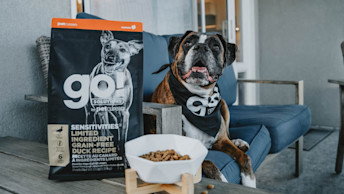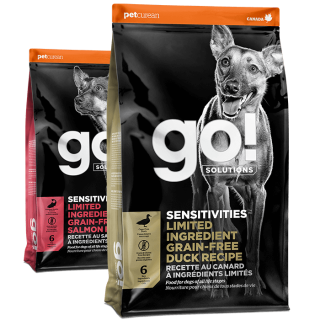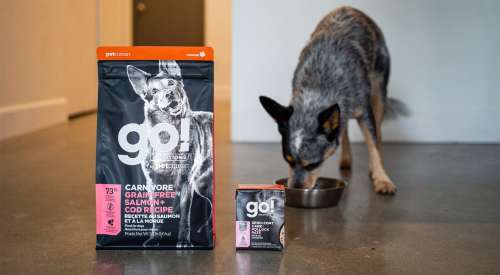April 8, 2024
What to Feed When Your Dog Has a Yeast Infection

Yeast infections in dogs are no fun for you or your furry friend. The incessant itching, licking, and skin irritation they cause can really take a toll. As a dog owner, you want nothing more than for your pup to feel comfortable and healthy.
While there are various treatment options for yeast infections, one aspect many dog owners overlook is diet. The food you feed your dog plays a huge role in their health and can either help or exacerbate issues like yeast overgrowth. In this article, we’ll explore the connections between diet and yeast infections in dogs. Let’s dig in!
What Are Yeast Infections in Dogs?
Yeast infections in dogs occur when there is an overgrowth of yeast on a dog's skin. While small amounts of yeast naturally occur on a dog's skin, an overgrowth can cause irritation and infection3.
Some common symptoms of yeast infections in dogs include:
- Rashes or red, irritated skin
- Excessive itching and scratching
- Skin thickening or “elephant” skin
- Ear infections
- Irritated paws
- Musty smell
- Crusty, scaley skin
Yeast infections can occur due to various reasons, including hormonal changes, prolonged use of certain medications and food sensitivities or allergies1,2.
Seeking veterinary care is important both for diagnosis and to get appropriate treatment to relieve your dog's discomfort.
The Role of Diet
If your dog has recurring yeast infections, determining if they’re experiencing an adverse food reaction may help to relieve the symptoms. Adverse food reactions in pets can often look like other conditions, such as environmental allergies. Because of this, diagnosis can be a bit tricky.
In severe cases, prescription hydrolyzed protein diets may be another option to consider. In these diets, the proteins have been broken down into smaller pieces so they are less likely to cause an immune response4.
Limited Ingredient Diets
Limited ingredient diets can be beneficial for dogs with recurrent yeast infections that may be caused by a food allergy or intolerance. Serving a diet with limited ingredients can help identify problem ingredients if your dog's symptoms improve.
These diets contain a single novel protein source, meaning an uncommon protein that your dog has likely never eaten before. The goal is to avoid ingredients that commonly cause allergic reactions in dogs, like beef, chicken, soy, wheat, and corn. Some examples of novel proteins include black soldier fly, wild boar, duck, or venison.

Recommended Solution
Limited Ingredient, Novel Protein Dog Food Recipes
Our Go! Solutions Sensitivities grain-free dog food recipes are specially formulated by experts to help dogs suffering from food allergies and sensitivities.
Limited ingredient dog food
Discussing limited ingredient diet options with your veterinarian can help determine if it may be an appropriate approach for your dog's yeast infections. Transition slowly over a minimum of 10 days if switching to this type of diet. Monitor your dog's symptoms closely over 8-12 weeks to determine if a limited ingredient diet helps manage symptoms.
Home Cooked Meals for Dogs
Your vet may also recommend consulting with a veterinary nutritionist to formulate a customized home-cooked diet. This can help identify ingredients your dog may be reactive to.
Homemade meals allow you to fully control what goes into your dog's diet. When formulating a home cooked diet, it's important to eliminate any ingredients that could be causing an adverse reaction. Common allergens for dogs include beef, chicken, wheat, corn, and soy. Try removing these ingredients one at a time to see if it provides relief.
It's essential to consult your veterinarian before putting your dog on a homemade diet. Don't attempt to formulate a balanced diet on your own, as this risks nutritional deficiencies.
Your vet can refer you to a veterinary nutritionist who can develop customized meal plans to meet your dog's needs. The nutritionist will ensure the home cooked recipes provide complete and balanced nutrition. This includes the right proportions of protein, fat, carbohydrates, vitamins, and minerals. Proper calcium ratios are especially important for growing puppies. Just remember—no do-it-yourself dog food is complete without input from the experts!
Should You Cut Carbs?
Carbohydrates provide an important energy source for both dogs and humans. When carbs are consumed, they are broken down into sugar (glucose) that can be used for energy. The amount of sugar in your dog's bloodstream is tightly regulated by the body.
While it's true that yeast feeds on sugar and needs it to grow, eating a diet high in carbs does not directly increase the risk of yeast infections in dogs. Here's why: If your dog does not consume enough carbs to maintain proper blood sugar levels, their body will produce sugar from other sources like protein to keep blood sugar in check. This helps prevent levels from getting too high or too low1,2.
In cases of diabetes, blood sugar levels stay chronically elevated, which can promote yeast overgrowth and infection1,2. Diabetes results in the inability to control blood sugar, not simply eating more carbs. So while carbs do get converted to sugar, your dog's body regulates the levels. Cutting carbs alone does not prevent yeast issues. It's more important to have your vet routinely monitor your dog for any underlying conditions like diabetes that could create an environment more susceptible to yeast overgrowth.
Yeast Ingredients in Food
Yeast ingredients like brewer's yeast and selenium yeast are commonly found in quality dog foods and provide beneficial nutrients for dogs. These ingredients are not a problem and do not contribute to yeast infections unless your dog has a specific allergy or intolerance to them.
Brewer's yeast is a good source of B vitamins like thiamine, riboflavin, niacin, and folate. It also provides minerals like selenium, chromium, and zinc. These nutrients support your dog's energy metabolism, immune system health, skin health, and more. Selenium yeast is another beneficial ingredient that provides selenium, an important antioxidant mineral for dogs.
The yeast in these ingredients is not the same type of yeast that causes infections. Unless your veterinarian has diagnosed your dog with a specific yeast allergy or intolerance, yeast ingredients like brewer's yeast and selenium yeast can safely provide nutritional benefits without contributing to yeast overgrowth or infections.
Conclusion
Recurrent yeast infections in dogs can be uncomfortable and frustrating to deal with. The good news is that with proper treatment, yeast infections are manageable conditions. There are several ways to tackle troublesome yeast. Limited ingredient diets containing novel proteins can help manage symptoms of food sensitivities that may contribute to yeast overgrowth.

With vigilant monitoring for symptoms, routine veterinary care, and dietary management when needed, yeast infections can often be reduced or resolved. The key is working closely with your veterinarian to find the approach that brings your dog relief and returns them to comfort.
Charach, M. "Malassezia Dermatitis." Canadian Veterinary Journal 38, no. 5 (1997): 311-314.
Faergemann, J. "Atopic Dermatitis and Fungi." Clinical Microbiology Reviews 15, no. 4 (2002): 545-563. doi:10.1128/CMR.15.4.545-563.2002.
"Yeast Dermatitis in Dogs." VCA Canada. Accessed March 20, 2024. https://vcacanada.com/know-your-pet/yeast-dermatitis-in-dogs.
"What to Know About Hydrolyzed Protein Dog Food" PetMD. Accessed March 20, 2024. https://www.petmd.com/dog/nutrition/hydrolyzed-protein-dog-food.



